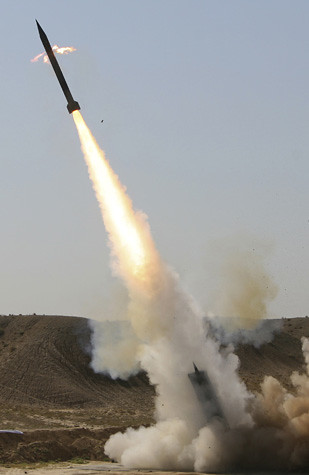
The Islamic Republic of Iran launched a short-range missile test on September 27, 2009. The middle-eastern nation has been subjected to another round of threats and political attacks by the leading imperialist states of the US, UK and France., a photo by Pan-African News Wire File Photos on Flickr.
US moves new forces to Gulf
Wednesday, 04 July 2012 15:02
TEHRAN — Iran and the United States yesterday underlined their military readiness for conflict should faltering diplomacy over Tehran’s atomic activities fail, as tensions rose over tougher Western sanctions.
Iran said it successfully fired several dozen missiles — including a medium-range Shahab-3 ballistic weapon with a range capable of striking Israel — in war games in its central desert region designed to show its capacity for counter-attack.
US officials, meanwhile, detailed a quiet US military build-up in the Gulf region that includes the deployment of warships and F-22 stealth fighter jets.
The belligerent posturing came on the day technical experts from Iran and from world powers, including the United States, were due to meet in Istanbul in the latest round of talks.
The negotiations have been downgraded from a senior political level after three previous rounds this year that failed to bridge vast differences held by each side.
Iran refuses to bow to Western demands that it curb its sensitive uranium enrichment under the pressure of punishing economic sanctions that were ramped up last week to their most severe level so far.
“The sanctions imposed against our country are the harshest and strongest ever imposed. If the enemies think they can weaken Iran with these sanctions, they are wrong,” Iranian President Mahmoud Ahmadinejad was quoted as saying by the official IRNA news agency.
Tehran is demanding its “right” to enrichment be recognised and the “hostile” sanctions be eased for the talks to progress. It rejects Western suspicions that it is seeking a nuclear weapons “break-out" capability.
Iranian foreign ministry spokesman Ramin Mehmanparast accused the Western nations in the so-called P5+1 group (comprising the United States, Britain, France, Russia and China, plus Germany) of dragging out the talks and perhaps wanting them to fail.
“Many people are starting to conclude that maybe there are specific goals in dragging out the talks and preventing their success. One option is that perhaps there is a link with the US (presidential) election” in November, he said.
Iranian Foreign Minister Ali Akbar Salehi, speaking on Monday to the ISNA news agency, said that, should the talks collapse, “the other alternative is confrontation.”
Israel, which is not party to the talks, has warned it could launch pre-emptive air strikes on Iran’s nuclear facilities to hinder what it sees as a threat by the Islamic republic to its existence.
US President Barack Obama has also repeatedly said that “all options” — including that of US military action — are on the table regarding Iran. — AFP.
No comments:
Post a Comment